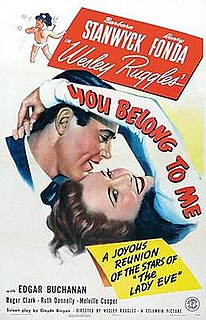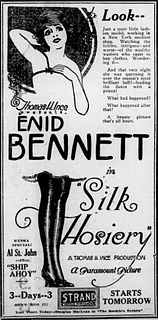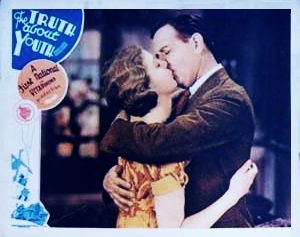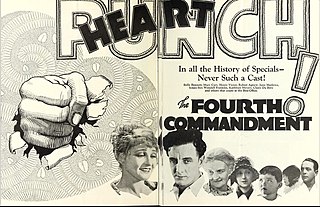
Recaptured Love is a 1930 early talkie pre-Code musical drama film based on the play Misdeal by Basil Woon about a man who experiences a mid life crisis that results in his divorce. It stars Belle Bennett and John Halliday.

Bright Lights is a 1930 American pre-Code musical comedy film photographed entirely in Technicolor and produced and released by First National Pictures, a subsidiary of Warner Brothers. Although filmed in December 1929, the film sat on the shelf until the autumn of 1930 when it was given a limited release. However, Warners quickly withdrew the film when the studio realized that the public had grown weary of musicals. Warners believed that this attitude would only last for a few months, but, when the public proved obstinate, they reluctantly re-released the film early in 1931 after making a few cuts to it. The film stars Dorothy Mackaill, Frank Fay, Noah Beery and Frank McHugh. It also features the screen debut of John Carradine, who appears in a small uncredited role.

You Belong to Me is a 1941 American romantic comedy film produced and directed by Wesley Ruggles and starring Barbara Stanwyck and Henry Fonda. Based on a story by Dalton Trumbo, and written by Claude Binyon, the film is about a wealthy man who meets and falls in love with a beautiful doctor while on a ski trip. After a courtship complicated by his hypochondria, she agrees to marry him on the condition that she continue to practice medicine. His jealousy at the thought of her seeing male patients, however, soon threatens their marriage. The film was released in the United Kingdom as Good Morning, Doctor, and was remade as Emergency Wedding in 1950.

Silk Hosiery is a 1920 American silent comedy film directed by Fred Niblo and starring Enid Bennett. A print listed as being in nitrate exists in the Library of Congress and another in the UCLA Film and Television Archive.

The Truth About Youth is a 1930 American pre-Code drama with songs produced and distributed by First National Pictures, a subsidiary of Warner Bros. Directed by William A. Seiter, the film stars Loretta Young, Conway Tearle, David Manners and Myrna Loy. It was based on the 1900 play When We Were Twenty-One, written by Henry V. Esmond.

Morals for Women is a 1931 American pre-Code talking film produced and released by Tiffany Pictures, often considered a low budget studio. The film stars Bessie Love and Conway Tearle. It is preserved at the Library of Congress, has been released on DVD, and is in the public domain.

The Fourth Commandment is a 1927 American silent drama directed by Emory Johnson and based on the short story "The Fourth Commandment" by Emilie Johnson.. The film stars Belle Bennett, Henry Victor, June Marlowe, and Mary Carr. The film was released on March 20, 1927 by Universal Pictures. The Fourth Commandment is - "Honor your father and your mother.. ."

Guilty Hands is a 1931 American pre-Code crime film starring Lionel Barrymore, Kay Francis and Madge Evans and directed by W. S. Van Dyke, with uncredited assistance from Barrymore. The story concerns an attorney who murders a man who wants to marry his daughter.

The Squall is a 1929 American pre-Code drama film directed by Alexander Korda and starring Myrna Loy, Richard Tucker, Alice Joyce and Loretta Young, and based on the 1926 play The Squall by Jean Bart.

Maybe It's Love, also known as Eleven Men and a Girl, is an all-talking 1930 pre-Code musical comedy film produced and distributed by Warner Bros. and directed by William A. Wellman. The movie stars Joan Bennett, Joe E. Brown and James Hall. The film is based on George Ade's 1904 play The College Widow and is a remake of Warner's own 1927 silent version of the story, which starred Dolores Costello. The play had also been filmed in 1915, starring Ethel Clayton.

Love Comes Along is a 1930 American romantic film directed by Rupert Julian, written by Wallace Smith, based on the uncompleted play Conchita by Edward Knoblock. It was a vehicle specifically picked to highlight the vocal talents of Bebe Daniels, which also starred Lloyd Hughes and Montagu Love. It made a profit of $258,000.
Lady in a Jam is a 1942 film comedy directed by Gregory La Cava, and starring Irene Dunne, Patric Knowles, Ralph Bellamy, and Eugene Pallette.
Rich People is a 1929 pre-Code talking picture directed by Edward H. Griffith and starring Constance Bennett. It was produced by Ralph Block and distributed through Pathé Exchange. It is based on a short story from the March–July 1928 Good Housekeeping magazine.
Come Closer, Folks is a 1936 American comedy film directed by D. Ross Lederman. A print is preserved in the Library of Congress collection.
Love Me is a surviving 1918 American drama silent film directed by Roy William Neill and written by C. Gardner Sullivan. The film stars Dorothy Dalton, Jack Holt, William Conklin, Dorcas Matthews, Melbourne MacDowell and Elinor Hancock. The film was released on March 18, 1918, by Paramount Pictures.

The Devil's Needle is a 1916 silent film drama directed by Chester Withey and starring Norma Talmadge and Tully Marshall. It was produced by D. W. Griffith's Fine Arts Film Company and distributed by Triangle Films.

Man-Made Women is a 1928 American silent comedy drama film directed by Paul L. Stein and starring Leatrice Joy. It was produced by Cecil B. DeMille and Ralph Block and distributed through Pathé Exchange.

The Amazing Woman is a 1920 American silent drama film directed by John G. Adolfi and starring Ed Coxen and Ruth Clifford. It was released by the Republic Distributing Company.

Local Boy Makes Good is a 1931 American Pre-Code comedy film directed by Mervyn LeRoy and written by Robert Lord, Raymond Griffith and Ray Enright. The film stars Joe E. Brown, Dorothy Lee, Ruth Hall, Edward Woods, Edward Nugent and Wade Boteler. The film was released by Warner Bros. on November 27, 1931.

A Voice in the Dark is a 1921 American black-and-white silent film directed by Frank Lloyd and starring Ramsey Wallace, Irene Rich, and Alec B. Francis. The film is based on the play A Voice in the Dark by Ralph E. Dyar.
















